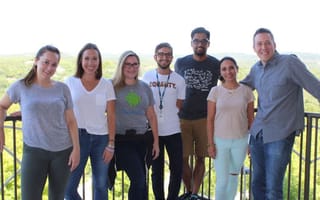All great startup stories begin with just that — a story, and often one that’s filled with all the rollercoaster ups and downs you’d expect from a blockbuster movie.
These origin tales help illustrate who is at the core of these growing tech companies and illuminate how their early experiences shaped where they are now. We connected with five execs from Austin tech to better understand our neighbors within the local tech community.

Before DISCO grew into what it is today, the legal tech e-discovery firm was actually named Fetch. We’ll let CEO and Co-Founder Kiwi Camara explain why.
Tell us briefly about your founding story. What’s one thing people outside your team might not know about how your company was founded?
DISCO was born out of our frustration with conventional e-discovery tools that were slow and difficult for lawyers to use. Instead of being forced to adapt our work methods to technology, we wanted to invent technology that works the way lawyers work. We built an internal tool at our firm that put the evidence from big investigations right at the lawyer’s fingertips. DISCO was the result, and today we are the fastest-growing and best-funded e-discovery provider in North America. The original name of our product was Fetch, since the software was built to retrieve the most relevant results from the evidence.
DISCO was born out of our frustration with conventional e-discovery tools that were slow and difficult for lawyers to use.”
How has DISCO evolved since those early days? Where do you see the company going next?
DISCO has grown from an internal tool at a Houston law firm to the best-funded enterprise legaltech company, now headquartered in Austin with over 300 employees. As for where we are going next, there are many more aspects of the legal industry where technology can be vastly improved. We’re broadening our tech platform beyond e-discovery to cover the entire litigation lifecycle from case inception to final resolution. We’re also investing more in our people, who make DISCO’s vision a reality every day.

There was a time when working in enterprise tech meant only working in the Bay Area. Read on to hear MongoDB’s VP of Corporate Sales Javier Molina speak on how MongoDB broke out of the Silicon Valley bubble and got its start.
Tell us briefly about your founding story. What’s one thing people outside (or even inside) your team might not know about how your company was founded?
MongoDB evolved out of relationships first built during an internship: Eliot Horowitz, our co-founder and CTO, interned for fellow co-founder, Dwight Merriman, at adtech giant DoubleClick. A few years later — and one additional, profitable joint venture later, the two were frustrated with dealing with traditional database options, based on 40-year-old technology, that slowed innovation and made them recreate boilerplate infrastructure with every project. Joined by fellow former colleague Kevin Ryan, the three set out to build a database for modern applications and to give developers a better way to work with data.
When we started MongoDB 10 years ago, people thought we were completely crazy for starting a database company in New York City.”
How has MongoDB evolved since those early days (be specific!) — and where do you see the company going next?
When we started MongoDB 10 years ago, people thought we were completely crazy for starting a database company in New York City. The question always was, “When are you moving to California? You can’t build an enterprise software company outside of Silicon Valley.” And our founders always responded: never. That mindset has allowed us to grow and build our business wherever our customers are based — not where the competition lives. We’ve grown to 40+ global offices, with leadership based in various major cities, including one of our fastest growing offices supporting multiple departments, right here in Austin. The database market is one of the largest and fastest growing in the software industry, and we are just getting started.

Did you know that Medallia’s co-founders, Amy Pressman and Borge Hald are married? We didn’t either. Talent Acquisition Manager Alex Rittenberry gave us the scoop on the experience management platform.
Tell us briefly about your founding story. What’s one thing people outside your team might not know about how your company was founded?
After a poor experience at a hotel, Medallia was founded with a mission to improve the guest experience at hotels. Eighteen years later, the company works with some of the world’s most iconic brands across all verticals including retail, insurance, healthcare, telecommunications, financial services and more. Customer experience has made its way to the boardroom due to its ability to impact the bottom line. Medallia doesn’t just help organizations improve customer and employee experiences, it also increases their opportunity to upsell and cross-sell, too. We believe that customers build the best products, employees build the best companies and together, we build the best brands. Fun fact: Our co-founders Amy and Borge are married!
After a poor experience at a hotel, Medallia was originally founded with a mission to improve the guest experience at hotels. Now we do much more.”
How has Medallia evolved since those early days? Where do you see the company going next?
We’ve grown to over 1,300 employees, have offices across the globe and went public in July. Our industry has been flooded with vendors entering our space with survey tools, but surveys are just the tip of the iceberg when it comes to customer and employee experience. Having people only take a survey to share their experience is like looking at the past in the rearview mirror to drive future action. The future of customer and employee experiences relies on looking at all of the journeys a customer and employee will have so that organizations will truly understand how to improve their experiences. While a lot has changed, Medallia has, and always will be, at the forefront.

Listen, we all make mistakes. Unfortunately — but also fortunately — when Self Inc. Founder and CEO James Garvey set up autopay and the autopay didn’t work… the inspiration for Self Inc. was born! Take it away, VP of Engineering Kevin Pho.
Tell us briefly about your founding story. What's one thing people outside your team might not know about how your company was founded?
Our CEO made a mistake. He thought he set his credit cards to autopay, but a few months and several missed payments later he learned otherwise. The autopay wasn’t working and his credit score was ruined. Researching how to rebuild his credit, he realized how many people were being denied access to credit products and struggling to build the credit they needed to accomplish their goals. The widespread problem of credit access inspired him to launch Self — formerly Self Lender.
In the early days, we didn’t plan to build a banking core to run our credit product. We were planning a more standard path of licensing banking software from a vendor. Since we had a launch commitment looming, however, and we couldn’t make the vendor relationship work, our three-person engineering team built a banking core in three months, and we hit our planned launch date.
One thing that hasn’t changed is our mission to help people get access to credit and save money while doing it.”
How has Self evolved since those early days — and where do you see the company going next?
One thing that hasn’t changed is our mission to help people get access to credit and save money while doing it. In executing on that mission, we’ve grown from a small group of engineers to a diverse group of 45 people collaborating across multiple departments. As a result of our customer focus and increased resources, we have helped over 400,000 customers toward their credit goals.

Before LeanDNA, Founder and CEO Richard Lebovitz spent 25 years working in factories. Through that experience, he saw an opportunity for a solution that’s built for the people who buy, sell and manage inventory.
Tell us briefly about LeanDNA’s. What’s one thing people outside your team might not know about how your company was founded?
Although we officially launched the company in 2014, LeanDNA was really born six years earlier with a small team and a few pilot clients who worked with us to help validate the power of our technology. It was important to me that we truly understood the root of the problem and were certain of the value and results we could bring to this space. We wanted to revolutionize the way lean factories are run and managed, but we had to make sure there was product-market fit before we began our rapid expansion. Once we felt confident in our product, we launched the company.
The company itself has grown from a few people renting out desks to full teams and leadership for all the critical areas of the business.”
How has LeanDNA evolved since those early days — and where do you see the company going next?
The company itself has grown from a few people renting out desks to full teams and leadership for all the critical areas of the business. We’re at 40 employees now and counting. The increase of customized products, globalization of supply chain networks and pressure to reduce costs while improving delivery performance allowed us to transition from educating prospects about factory challenges and opportunities in the early days to working with companies who feel the pain of the market shift on their own and seek out solutions like ours.
We are working on expanding our international support and growing into other verticals. As it stands, we’re a small Texas company working in 130 plus factories across 13 countries to help some of the world’s largest manufacturers. It’s very humbling to think about how far we’ve come.












